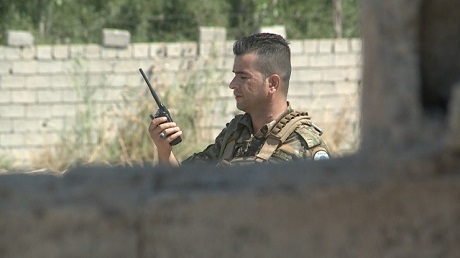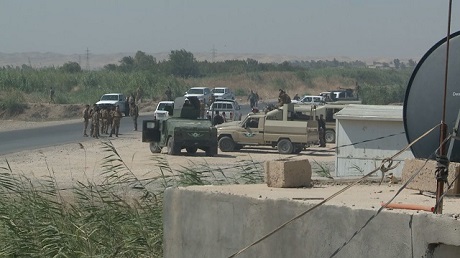Kurdistan


Heavily armed Peshmerga units assemble in Kolajo early on August 5, 2019 for an operation with Iraqi forces against Islamic State (ISIS) remnants in the disputed area. Photo: Rudaw
ERBIL, Kurdistan Region – Kurdish Peshmerga and Iraqi armed forces launched simultaneous operations against Islamic State (ISIS) militants in Kolajo, Diyala province on Monday morning, just days after militants killed four Kurdish security personnel in the disputed area.
“The objective behind this operation is to pursue ISIS militants and troublemakers in this region,” Brig. Gen. Kamal Mahmood, commander of the Peshmerga Infantry Force Brigade 5, told Rudaw on Monday.
Mahmood’s forces have been deployed by the Ministry of Peshmerga to reinforce troops already stationed on the Kifri front. They are joined by Brigade 131 of the Peshmerga 70 Unit, a force affiliated with the Patriotic Union of Kurdistan (PUK).
 Photo: Rudaw
Photo: Rudaw“We will increase watch posts in Kolajo and we have brought in more reinforcements and will station them in newly established frontlines,” Mahmood said.
Kolajo, a district of Kifri in Diyala province, is 188 kilometers southeast of Erbil between Kalar and Tuz Khurmatu. Sections of Diyala are disputed between both the Kurdistan Region and Iraqi federal government.
Monday’s operation comes just four days after ISIS militants killed four members of the Kurdish security forces and wounded eight others in a late-night assault on a checkpoint in Kolajo.
The extremist group claimed responsibility on Sunday.
Although the two forces worked together in the battle to retake Mosul from ISIS in 2016-17, joint Peshmerga-Iraqi armed forces operations have since become extremely rare, owing in part to the collapse of Erbil-Baghdad relations in October 2017.
 Photo: Rudaw
Photo: RudawIraqi Prime Minister Adil Abdul-Mahdi, as Iraq’s commander-in-chief, is coordinated the Iraqi side of the operation.
Abdul-Mahdi arrived in Diyala early on Monday to supervise the third phase of “Will of Victory” – a military campaign launched in July targeting ISIS sleeper cells, hideouts, and weapons caches across the country’s northwestern provinces and disputed territories.
“Day after day, activities by Daesh militants are increasing and this is because of the massive void left between Peshmerga and the Iraqi forces,” Jamal Iminiki, Peshmerga chief-of-staff, told Rudaw, using an Arabic acronym for ISIS.
ISIS militants who retreated from Syria have reestablished their foothold in the disputed areas, he warned.
Brig. Gen. Yahya Rasool, spokesperson for the Iraqi Joint Operations Command, acknowledged ISIS has increased its activities in the disputed areas, but insisted the threat will be removed through coordination with the Peshmerga.
“We have controlled a 605 kilometer long border with Syria,” he told Rudaw. “We carry out special operations into areas where ISIS militants are hiding.”
In a report published in late July, UN Security Council monitors said although ISIS has been militarily defeated, the terrorist group “has large numbers of fighters and other supporters in Iraq and the Syrian Arab Republic and is able to operate freely in many locations and mount regular attacks to show its potency and undermine public confidence in the local authorities”.
ISIS is consolidating and creating conditions for an eventual resurgence in its Iraqi and Syrian heartlands, the report warned.
“This process is more advanced in Iraq, where Abu Bakr al-Baghdadi and most of the ISIL (ISIS) leadership are now based. Others are elsewhere in the former ‘caliphate’ area and parts of the immediate neighborhood,” the report added.
ISIS was declared territorially defeated in Iraq in December 2017, but its remnants and sleeper cells remain active, returning to their earlier insurgency tactics.
The group sized vast areas of northern Iraq in the summer of 2014. At the height of its power between 2014 and 2016, ISIS controlled an area roughly the size of Great Britain, spread across both Iraq and Syria.
Iraq’s defense ministry announced on Sunday that US-led coalition warplanes killed six ISIS militants in an airstrike in Makhmour, 60 kilometers southwest of Erbil.








Comments
Rudaw moderates all comments submitted on our website. We welcome comments which are relevant to the article and encourage further discussion about the issues that matter to you. We also welcome constructive criticism about Rudaw.
To be approved for publication, however, your comments must meet our community guidelines.
We will not tolerate the following: profanity, threats, personal attacks, vulgarity, abuse (such as sexism, racism, homophobia or xenophobia), or commercial or personal promotion.
Comments that do not meet our guidelines will be rejected. Comments are not edited – they are either approved or rejected.
Post a comment